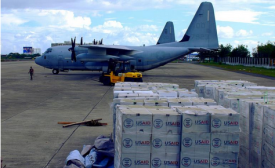foreign aid
While reporting on the phenomenon of T-shirts originating in the U.S. and winding up in Africa, NPR Planet Money recently turned up a Bat Mitzvah T-Shirt in Nairobi and asked for help tracking down the owner. After some Facebook sleuthing - and pinging the wrong Rachel Williams a couple of times - JTA's Adam Soclof finally got in touch with Rachel Aaronson, who led him to Jennifer.
Aid agencies paid Somalia's al-Shabab militants for access to areas under their control in the 2011 famine, according to a joint report by two think tanks. In many cases al-Shabab insisted on distributing the aid and kept much of it for itself, the report says. Some of the groups are still paying al-Shabab to operate in the large parts of Somalia it still holds, it adds.
Since Typhoon Haiyan struck the Philippines a month ago, the world has wanted to help the devastated areas. Yet as we’ve seen in the wake of other mega-disasters, well-meaning assistance to shattered communities can cause more harm than good. Let’s lay to rest some of the biggest misconceptions about how best to help victims of storms, earthquakes and other calamities.
Public diplomacy (PD), if defined as the act of a government engaging directly with a foreign public, then many governments are currently conducting PD towards the Filipino public in the aftermath of Typhoon Haiyan's devastation. Most public diplomacy scholars and practitioners refer to the foreign aid assistance in the wake of a disaster as "aid diplomacy."
Myanmar's president called Thursday for more investment and development assistance from the Philippines, saying his country needs help to catch up with the rest of Southeast Asia after emerging from nearly two decades of economic sanctions. President Thein Sein's visit represents a milestone in relations with the Philippines, one of the harshest critics of Myanmar's former ruling junta.

APDS Blogger: Shannon Haugh
The international rules that define what spending rich countries can count as foreign aid – and which developing countries are eligible to receive aid – are up for grabs for the first time in decades, with potential faultlines being drawn over whether donors should be able spend more aid money on support for private companies overseas.
The war in Afghanistan is transitioning to its endgame. But the drawdown hasn’t stopped the billions in U.S. aid flowing into the country, and after 12 years of spending on this scale, we’re still losing money—hundreds of millions unaccounted for—almost as fast as we can write the next check. The spotty oversight of U.S. aid to Afghan forces is now set to get even worse as the main auditing group is in the country is about to have its presence dramatically reduced.







